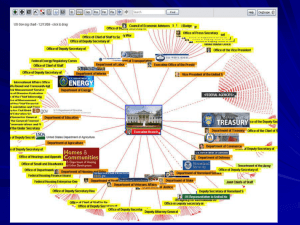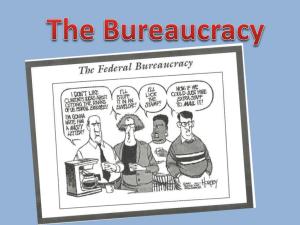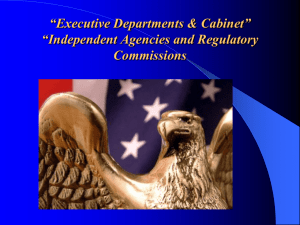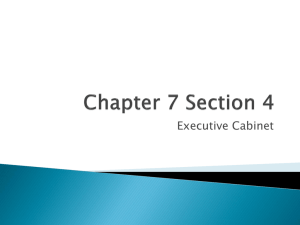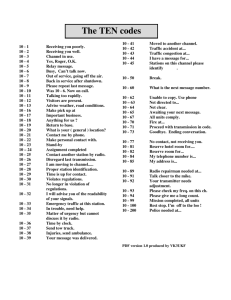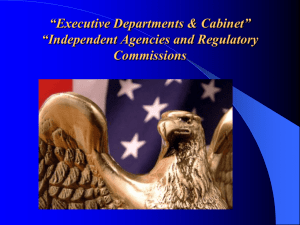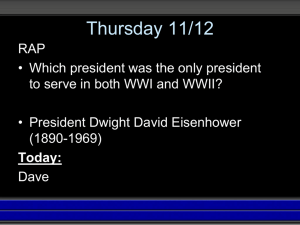1.7.15 AP Government
advertisement
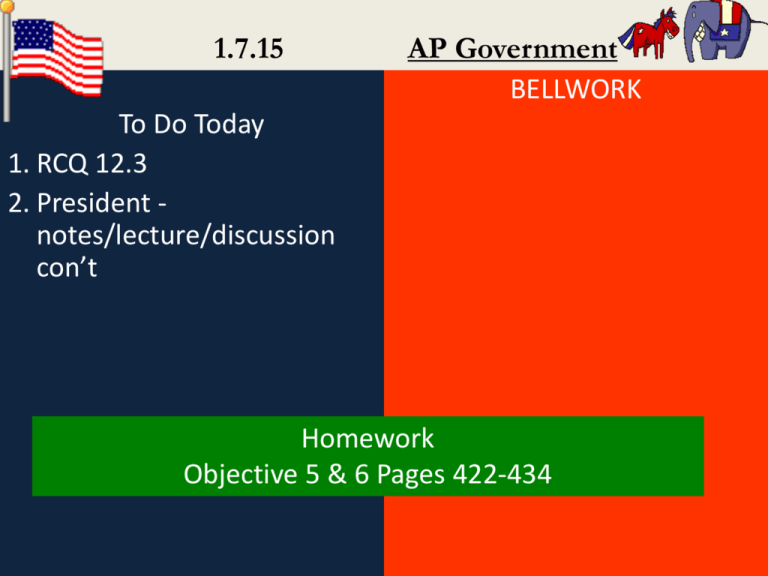
1.7.15 AP Government BELLWORK To Do Today 1. RCQ 12.3 2. President notes/lecture/discussion con’t Homework Objective 5 & 6 Pages 422-434 RCQ Objective 3 1. What are the Constitutional duties of the Vice-President? (2) 2. What were our three first Cabinet positions under George Washington? (3) 3. What is our newest cabinet position? (1) 4. Name and explain the duties of the three major policy making bodies in the Executive Office. (6) 5. What is the main duty of the Council of Economic Advisors? (1) a. Advise the president on banking regulations b. Advise the president and Congress on trade c. Advise the president on economic policy d. Advise the president on intelligence 6. What makes the White House staff different from the other agencies and/or people who support the President? (1) RCQ Objective 3 1. What are the Constitutional duty(s) of the Vice-President (2) preside over Senate; break ties take over if pres. becomes unable 2. What were our three first Cabinet positions under George Washington? (3) state, treasury, war 3. What is our newest cabinet position? (1) Homeland Security 4. Name and explain the duties of the three major policy making bodies in the Executive Office. (6) NSC- foreign policy, national security CEA- economic policy OMB- prepare budget 5. What is the main duty of the Council of Economic Advisors? (1) a. Advise the president on banking regulations b. Advise the president and Congress on trade c. Advise the president on economic policy d. Advise the president on intelligence 6. What makes the White House staff different from the other agencies and/or people who support the President? (1) various answers Running the Government: The Chief Executive THE PEOPLE WHO HELP THE PRESIDENT GET THINGS DONE Before we get started…. • We must understand this word: – Bureaucracy- a hierarchical authority structure that uses task specialization to carry out the tasks of our government • Example: If the gardener that keeps up the lawn for the state capitol building has a problem, they do not see the President, they see the person who is in charge of the capital lawns. • EVERYONE who works for the bureaucracy has a specialized task and reports to the person directly above them… PRESIDENT IS AT THE TOP! How does the President control the Bureaucracy? • Appoint top-level administrators that support the President’s vision – New presidents have 500 high-level positions available for appointment Running the Office The People Who Support the President! 1. The First Lady 2. The Vice President – Their role has increased overtime 3. The Cabinet – Informal advisory body 4. The Executive Offices – Work behind the scene to get the job done • National Security Council • The Council of Economic Advisors • The Office of Management and Budget 5. The White House Staff The Vice President • 3 Duties – Preside over the Senate – Cast the deciding vote in a tie in the Senate – Wait for the President to Die **Often acts as a recon operative (taking positions early on behalf of president) or attack dog (saying things that may be controversial) The Cabinet • Informal advisory body • Not mentioned in the Constitution • President appoints/Confirmed by the Senate – Of the more than 600 presidential appointments made since 1789, only 14 have been turned down or rejected by the Senate • 2 Major Jobs of the Cabinet – Administrative head of the executive departments – Advise the President TABLE 12.4: Cabinet Departments Three Departments you need to know: • State (makes Foreign Policy, treaty negotiations, one of the two oldest departments--1789) • Treasury (Serves as the Government’s Banker—The other oldest department--1789) • Homeland Security—(Protects against terrorism and responds to natural disasters— newest department—2002) • The Ability to create a new CabinetLevel Department is one of the examples of how Presidential power has increased over time, and therefore, the scope of government. Executive Office The Executive Office—3 SUB OFFICES (These are specifically policy-making bodies) National Security Council (NSC) Council of Economic Advisers (CEA) Office of Management and Budget (OMB) The Executive Office—3 SUB OFFICES (These are specifically policy-making bodies) National Security Council (NSC) –1947 – Purpose is to coordinate the President’s foreign and military policy advisors – Formal members include: • • • • President Vice President Secretary of State Secretary of Defense FIGURE 12.1: Executive Office of the President The Executive Office • Established in Congress in 1939 • National Security Advisory NSC –1947 – Coordinate the President’s foreign and military policy advisors • Vice President • Secretary of State • Secretary of Defense The Executive Office • Council of Economic Advisors – 3 member body appoint by the president to advise him/her on economic policy – http://www.whitehouse. gov/administration/eop/ cea The Executive Office • The Office of Management and Budget – Created in 1921 – Helps the president prepare his yearly budget and review the cost analysis of any proposed piece of legislation – http://www.whitehouse.gov/omb/ White House Staff President’s personal support team Chief of staff Press secretary Anonymous and loyal President sets style and tone The White House Staff • Include key aides the president sees daily – 600 People • The Chief of Staff • http://www.washington post.com/wpsrv/politics/interactives /westwing/index.html Dennis McDonough
